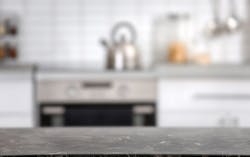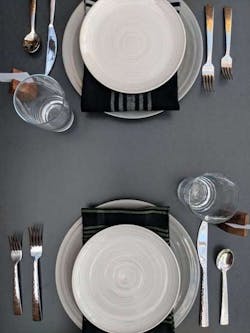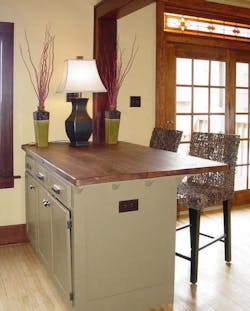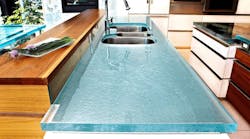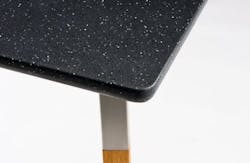Rethinking the Countertop With Innovative New Materials
Countertops are one of the biggest design considerations in the kitchen. Natural stones and classic marbles are still the top choice among today’s consumers, but what other options are available for homeowners who want to break from the status quo?
Whether opting for more sustainable materials or just looking for cheaper alternatives to traditional surfaces, these innovations offer homeowners a new way of thinking about their countertops.
Recycled Paper
In 2018, U.S. landfills received 17.2 million tons of paper and paperboard, according to the Environmental Protection Agency. Rather than wasting that valuable resource, countertops made from recycled paper give old scraps new life.
Recycled paper countertops begin with a mixture of post-consumer recycled paper and cardboard, which is then combined with natural pigments and binding resins and baked in industrial ovens at high temperatures to guarantee water and heat resistance.
Manufacturers like PaperStone turn recycled paper into what they describe as a “hardwood-like, highly workable, non-brittle composite panel” that is resistant to cuts, scratches, burns, and stains.
The price of PaperStone products varies depending on the color and thickness of the slab, the layout of the installation, and cost of installation, but on average, a recycled paper countertop costs around $75 to $125 per square foot installed, similar to a high-quality quartz or granite product.
The binding resins used to create paper countertops make the recycled paper resistant to heat up to 350 degrees Fahrenheit, non-porous, and resistant to staining and chipping. Recycled paper countertops require regular maintenance to prolong their lifespan. Luckily, many of the industry’s leading manufacturers provide sealants that can be applied repeatedly to resist wear over time, Rise reports.
PaperStone's countertops are assembled as heat- and scratch-resistant composite panels.
Image: PaperStone
READ MORE: Building Products
Repurposed Wood
Countertops made from repurposed wood, typically from hardwoods like oak, pine, maple, or walnut, offer a spin on classic butcher block countertops, and not only are they stylish, but they’re also sustainable and affordable.
Gaylord, Minnesota-based manufacturer Antique Woodworks offers reclaimed wood countertops that average $85 per square foot and are customized to fit any space. By comparison, the average cost of a quartz countertop is $80 per square foot. The company finishes its countertop surfaces with a mixture of boiled linseed oil, catalytic driers, and waxes for durability and water resistance.
The company gathers reclaimed wood from barns and other projects, but it also uses “Urban Logged” materials for woods like Cherry, Black Walnut, and Butternut. Urban Logged wood is sourced from trees that are destined for cutting because they are in an urban setting. Rather than those trees simply being chipped or incinerated, Antique Woodworks gives them new life in the form of custom countertops.
This red oak countertop from Antique Woodworks was produced from reclaimed wood.
Image: Antique Woodworks
Glass
Quebec manufacturer ThinkGlass is making all-glass countertops a reality by fusing the material at a high temperature for hand-made glass panels with “nearly unlimited thicknesses,” the company says.
As an inert, non-porous material that does not release any VOCs, ThinkGlass’ kitchen countertops are hygienic and durable with little to no deterioration over time at thickness options ranging from ½ to 12 inches. They’re also transparent, meaning they can be paired with LED displays to illuminate the kitchen.
The luxury look of all-glass countertops comes at a price, however. Because of their precise craftsmanship, glass countertops are priced on the high end at around $200 to $400 per square foot. ThinkGlass provides large seamless surfaces up to 7 feet by 10 feet for installation.
ThinkGlass countertops can be manufactured with "nearly unlimited thicknesses," the company says.
Image: ThinkGlass
Polyester
Countertops made from polyester resin are eco-friendly and resistant to standard wear, heat, humidity, and cleaning chemicals. DURAT countertops from Green Goods Healthy Building Solutions contain recycled plastics mixed with polyester resin and are 100% recyclable, the company claims.
Once hardened, polyester resin is non-porous, making it a healthy option for a kitchen prep surface. DURAT can be renewed over time by slight sanding, but even despite wear and tear, all polyester countertops maintain a glossy finish.
Durat counters cost a comparatively affordable $30 to $60 per square foot for the material alone, not including installation, and finishes can be customized by color and texture.
